Organisational Behaviour Report: Tesco PLC, Culture, Motivation, Teams
VerifiedAdded on 2023/01/12
|19
|5709
|21
Report
AI Summary
This report provides a detailed analysis of organisational behaviour, focusing on Tesco PLC. It begins with an introduction to organisational behaviour and its key elements, followed by an analysis of the influence of organisational culture, politics, and power on employee behaviour and team performance. The report then delves into motivational theories, including content theories like Maslow's Hierarchy of Needs and Herzberg's Two-Factor Theory, and their application within Tesco. It also explores the effectiveness of teams, comparing effective and ineffective team dynamics and analysing relevant team theories. Furthermore, the report examines the application of organisational behaviour concepts and philosophies, evaluating their effects in both positive and negative ways. Finally, the report concludes with a critical analysis of team development theories and their relevance, offering insights into how Tesco can improve its organisational structure and employee engagement.
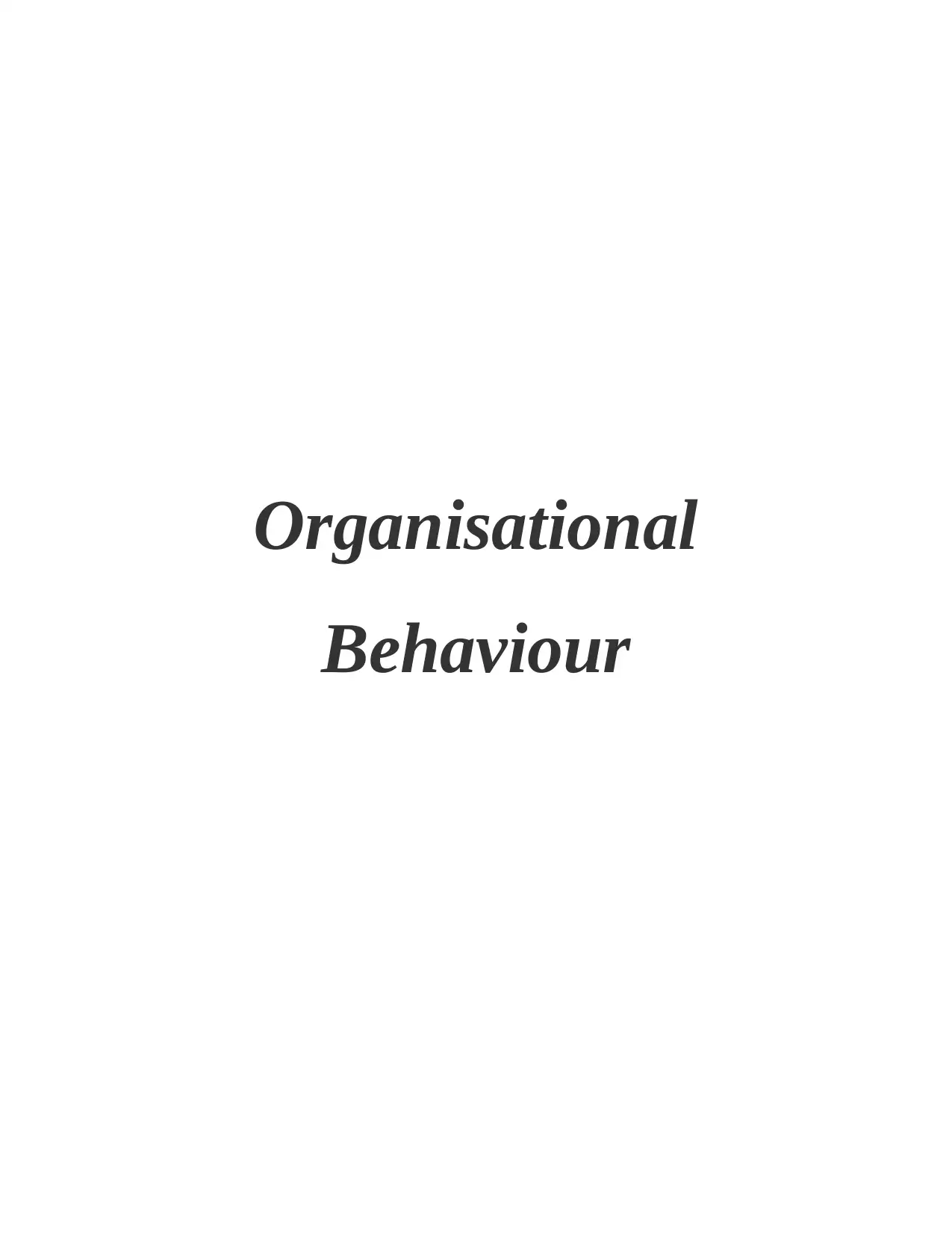
Organisational
Behaviour
Behaviour
Paraphrase This Document
Need a fresh take? Get an instant paraphrase of this document with our AI Paraphraser
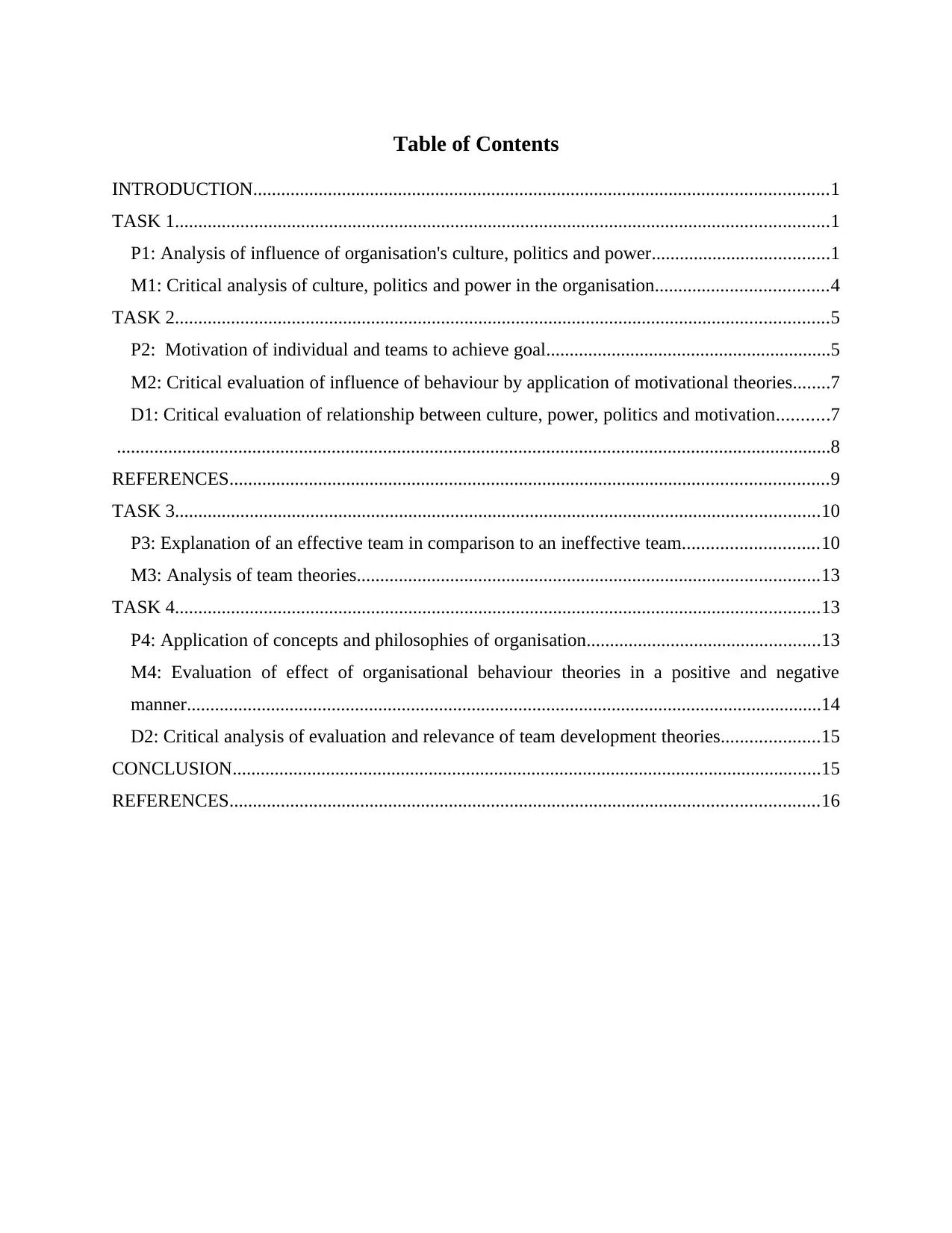
Table of Contents
INTRODUCTION...........................................................................................................................1
TASK 1............................................................................................................................................1
P1: Analysis of influence of organisation's culture, politics and power......................................1
M1: Critical analysis of culture, politics and power in the organisation.....................................4
TASK 2............................................................................................................................................5
P2: Motivation of individual and teams to achieve goal.............................................................5
M2: Critical evaluation of influence of behaviour by application of motivational theories........7
D1: Critical evaluation of relationship between culture, power, politics and motivation...........7
.........................................................................................................................................................8
REFERENCES................................................................................................................................9
TASK 3..........................................................................................................................................10
P3: Explanation of an effective team in comparison to an ineffective team.............................10
M3: Analysis of team theories...................................................................................................13
TASK 4..........................................................................................................................................13
P4: Application of concepts and philosophies of organisation..................................................13
M4: Evaluation of effect of organisational behaviour theories in a positive and negative
manner........................................................................................................................................14
D2: Critical analysis of evaluation and relevance of team development theories.....................15
CONCLUSION..............................................................................................................................15
REFERENCES..............................................................................................................................16
INTRODUCTION...........................................................................................................................1
TASK 1............................................................................................................................................1
P1: Analysis of influence of organisation's culture, politics and power......................................1
M1: Critical analysis of culture, politics and power in the organisation.....................................4
TASK 2............................................................................................................................................5
P2: Motivation of individual and teams to achieve goal.............................................................5
M2: Critical evaluation of influence of behaviour by application of motivational theories........7
D1: Critical evaluation of relationship between culture, power, politics and motivation...........7
.........................................................................................................................................................8
REFERENCES................................................................................................................................9
TASK 3..........................................................................................................................................10
P3: Explanation of an effective team in comparison to an ineffective team.............................10
M3: Analysis of team theories...................................................................................................13
TASK 4..........................................................................................................................................13
P4: Application of concepts and philosophies of organisation..................................................13
M4: Evaluation of effect of organisational behaviour theories in a positive and negative
manner........................................................................................................................................14
D2: Critical analysis of evaluation and relevance of team development theories.....................15
CONCLUSION..............................................................................................................................15
REFERENCES..............................................................................................................................16
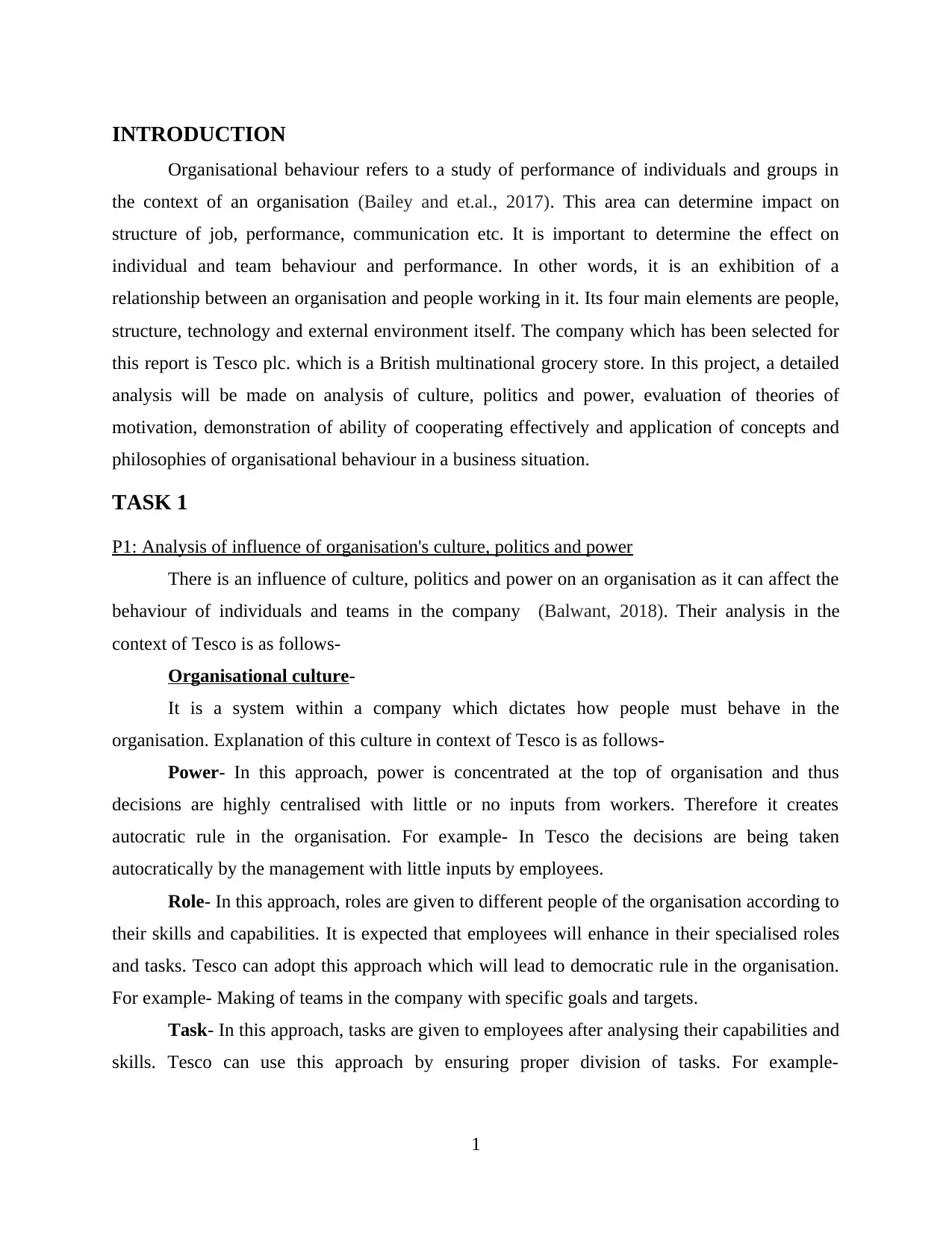
INTRODUCTION
Organisational behaviour refers to a study of performance of individuals and groups in
the context of an organisation (Bailey and et.al., 2017). This area can determine impact on
structure of job, performance, communication etc. It is important to determine the effect on
individual and team behaviour and performance. In other words, it is an exhibition of a
relationship between an organisation and people working in it. Its four main elements are people,
structure, technology and external environment itself. The company which has been selected for
this report is Tesco plc. which is a British multinational grocery store. In this project, a detailed
analysis will be made on analysis of culture, politics and power, evaluation of theories of
motivation, demonstration of ability of cooperating effectively and application of concepts and
philosophies of organisational behaviour in a business situation.
TASK 1
P1: Analysis of influence of organisation's culture, politics and power
There is an influence of culture, politics and power on an organisation as it can affect the
behaviour of individuals and teams in the company (Balwant, 2018). Their analysis in the
context of Tesco is as follows-
Organisational culture-
It is a system within a company which dictates how people must behave in the
organisation. Explanation of this culture in context of Tesco is as follows-
Power- In this approach, power is concentrated at the top of organisation and thus
decisions are highly centralised with little or no inputs from workers. Therefore it creates
autocratic rule in the organisation. For example- In Tesco the decisions are being taken
autocratically by the management with little inputs by employees.
Role- In this approach, roles are given to different people of the organisation according to
their skills and capabilities. It is expected that employees will enhance in their specialised roles
and tasks. Tesco can adopt this approach which will lead to democratic rule in the organisation.
For example- Making of teams in the company with specific goals and targets.
Task- In this approach, tasks are given to employees after analysing their capabilities and
skills. Tesco can use this approach by ensuring proper division of tasks. For example-
1
Organisational behaviour refers to a study of performance of individuals and groups in
the context of an organisation (Bailey and et.al., 2017). This area can determine impact on
structure of job, performance, communication etc. It is important to determine the effect on
individual and team behaviour and performance. In other words, it is an exhibition of a
relationship between an organisation and people working in it. Its four main elements are people,
structure, technology and external environment itself. The company which has been selected for
this report is Tesco plc. which is a British multinational grocery store. In this project, a detailed
analysis will be made on analysis of culture, politics and power, evaluation of theories of
motivation, demonstration of ability of cooperating effectively and application of concepts and
philosophies of organisational behaviour in a business situation.
TASK 1
P1: Analysis of influence of organisation's culture, politics and power
There is an influence of culture, politics and power on an organisation as it can affect the
behaviour of individuals and teams in the company (Balwant, 2018). Their analysis in the
context of Tesco is as follows-
Organisational culture-
It is a system within a company which dictates how people must behave in the
organisation. Explanation of this culture in context of Tesco is as follows-
Power- In this approach, power is concentrated at the top of organisation and thus
decisions are highly centralised with little or no inputs from workers. Therefore it creates
autocratic rule in the organisation. For example- In Tesco the decisions are being taken
autocratically by the management with little inputs by employees.
Role- In this approach, roles are given to different people of the organisation according to
their skills and capabilities. It is expected that employees will enhance in their specialised roles
and tasks. Tesco can adopt this approach which will lead to democratic rule in the organisation.
For example- Making of teams in the company with specific goals and targets.
Task- In this approach, tasks are given to employees after analysing their capabilities and
skills. Tesco can use this approach by ensuring proper division of tasks. For example-
1
⊘ This is a preview!⊘
Do you want full access?
Subscribe today to unlock all pages.

Trusted by 1+ million students worldwide
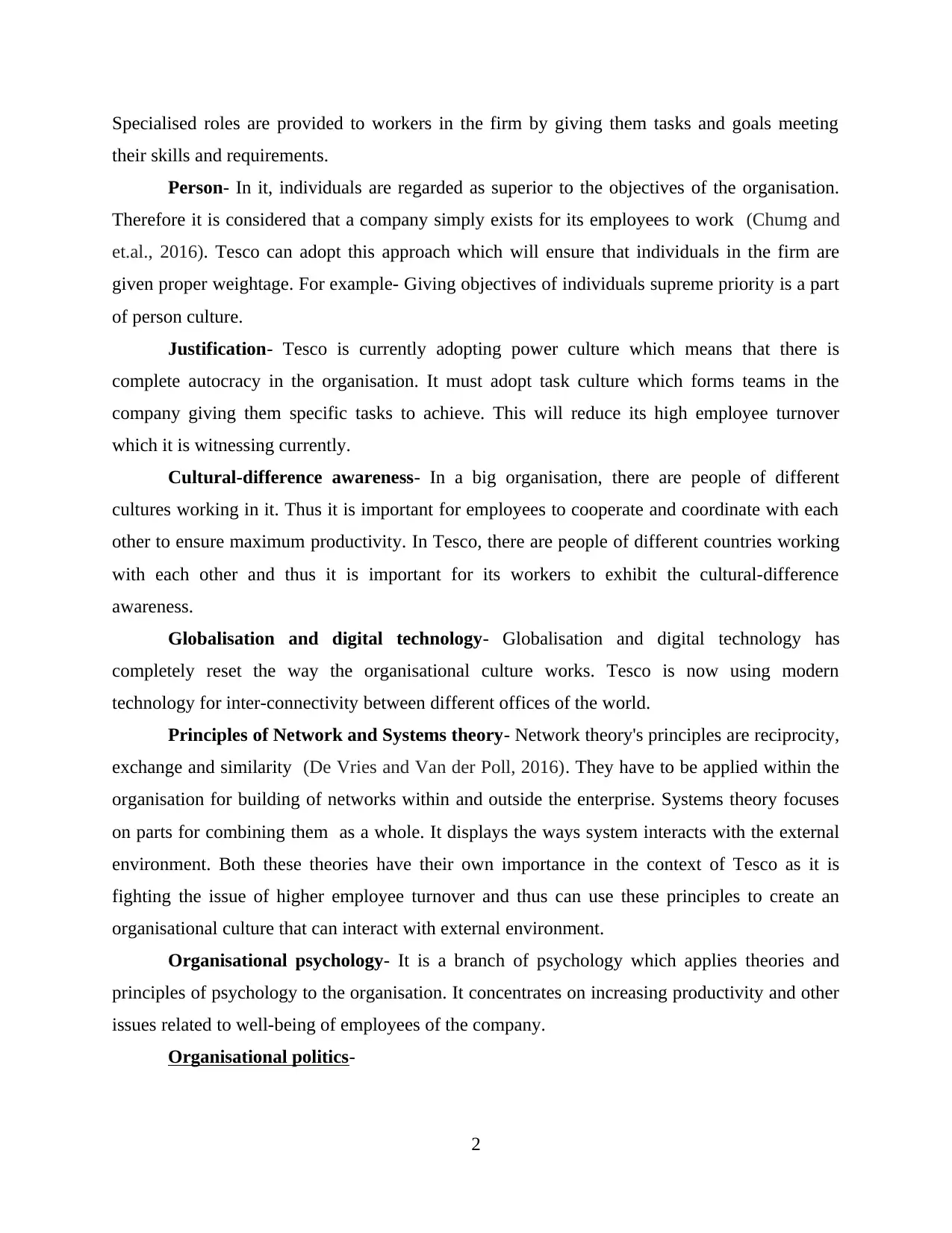
Specialised roles are provided to workers in the firm by giving them tasks and goals meeting
their skills and requirements.
Person- In it, individuals are regarded as superior to the objectives of the organisation.
Therefore it is considered that a company simply exists for its employees to work (Chumg and
et.al., 2016). Tesco can adopt this approach which will ensure that individuals in the firm are
given proper weightage. For example- Giving objectives of individuals supreme priority is a part
of person culture.
Justification- Tesco is currently adopting power culture which means that there is
complete autocracy in the organisation. It must adopt task culture which forms teams in the
company giving them specific tasks to achieve. This will reduce its high employee turnover
which it is witnessing currently.
Cultural-difference awareness- In a big organisation, there are people of different
cultures working in it. Thus it is important for employees to cooperate and coordinate with each
other to ensure maximum productivity. In Tesco, there are people of different countries working
with each other and thus it is important for its workers to exhibit the cultural-difference
awareness.
Globalisation and digital technology- Globalisation and digital technology has
completely reset the way the organisational culture works. Tesco is now using modern
technology for inter-connectivity between different offices of the world.
Principles of Network and Systems theory- Network theory's principles are reciprocity,
exchange and similarity (De Vries and Van der Poll, 2016). They have to be applied within the
organisation for building of networks within and outside the enterprise. Systems theory focuses
on parts for combining them as a whole. It displays the ways system interacts with the external
environment. Both these theories have their own importance in the context of Tesco as it is
fighting the issue of higher employee turnover and thus can use these principles to create an
organisational culture that can interact with external environment.
Organisational psychology- It is a branch of psychology which applies theories and
principles of psychology to the organisation. It concentrates on increasing productivity and other
issues related to well-being of employees of the company.
Organisational politics-
2
their skills and requirements.
Person- In it, individuals are regarded as superior to the objectives of the organisation.
Therefore it is considered that a company simply exists for its employees to work (Chumg and
et.al., 2016). Tesco can adopt this approach which will ensure that individuals in the firm are
given proper weightage. For example- Giving objectives of individuals supreme priority is a part
of person culture.
Justification- Tesco is currently adopting power culture which means that there is
complete autocracy in the organisation. It must adopt task culture which forms teams in the
company giving them specific tasks to achieve. This will reduce its high employee turnover
which it is witnessing currently.
Cultural-difference awareness- In a big organisation, there are people of different
cultures working in it. Thus it is important for employees to cooperate and coordinate with each
other to ensure maximum productivity. In Tesco, there are people of different countries working
with each other and thus it is important for its workers to exhibit the cultural-difference
awareness.
Globalisation and digital technology- Globalisation and digital technology has
completely reset the way the organisational culture works. Tesco is now using modern
technology for inter-connectivity between different offices of the world.
Principles of Network and Systems theory- Network theory's principles are reciprocity,
exchange and similarity (De Vries and Van der Poll, 2016). They have to be applied within the
organisation for building of networks within and outside the enterprise. Systems theory focuses
on parts for combining them as a whole. It displays the ways system interacts with the external
environment. Both these theories have their own importance in the context of Tesco as it is
fighting the issue of higher employee turnover and thus can use these principles to create an
organisational culture that can interact with external environment.
Organisational psychology- It is a branch of psychology which applies theories and
principles of psychology to the organisation. It concentrates on increasing productivity and other
issues related to well-being of employees of the company.
Organisational politics-
2
Paraphrase This Document
Need a fresh take? Get an instant paraphrase of this document with our AI Paraphraser
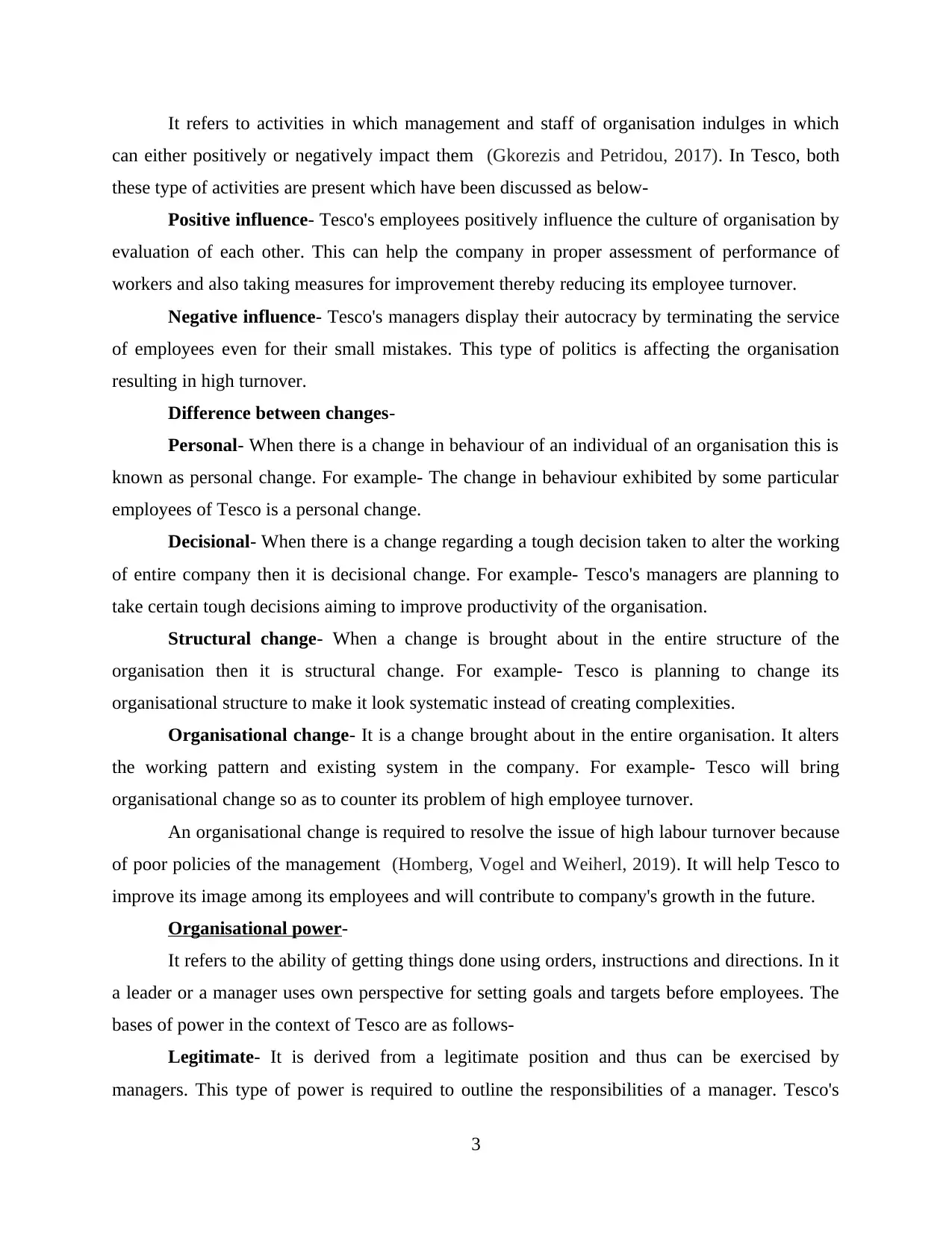
It refers to activities in which management and staff of organisation indulges in which
can either positively or negatively impact them (Gkorezis and Petridou, 2017). In Tesco, both
these type of activities are present which have been discussed as below-
Positive influence- Tesco's employees positively influence the culture of organisation by
evaluation of each other. This can help the company in proper assessment of performance of
workers and also taking measures for improvement thereby reducing its employee turnover.
Negative influence- Tesco's managers display their autocracy by terminating the service
of employees even for their small mistakes. This type of politics is affecting the organisation
resulting in high turnover.
Difference between changes-
Personal- When there is a change in behaviour of an individual of an organisation this is
known as personal change. For example- The change in behaviour exhibited by some particular
employees of Tesco is a personal change.
Decisional- When there is a change regarding a tough decision taken to alter the working
of entire company then it is decisional change. For example- Tesco's managers are planning to
take certain tough decisions aiming to improve productivity of the organisation.
Structural change- When a change is brought about in the entire structure of the
organisation then it is structural change. For example- Tesco is planning to change its
organisational structure to make it look systematic instead of creating complexities.
Organisational change- It is a change brought about in the entire organisation. It alters
the working pattern and existing system in the company. For example- Tesco will bring
organisational change so as to counter its problem of high employee turnover.
An organisational change is required to resolve the issue of high labour turnover because
of poor policies of the management (Homberg, Vogel and Weiherl, 2019). It will help Tesco to
improve its image among its employees and will contribute to company's growth in the future.
Organisational power-
It refers to the ability of getting things done using orders, instructions and directions. In it
a leader or a manager uses own perspective for setting goals and targets before employees. The
bases of power in the context of Tesco are as follows-
Legitimate- It is derived from a legitimate position and thus can be exercised by
managers. This type of power is required to outline the responsibilities of a manager. Tesco's
3
can either positively or negatively impact them (Gkorezis and Petridou, 2017). In Tesco, both
these type of activities are present which have been discussed as below-
Positive influence- Tesco's employees positively influence the culture of organisation by
evaluation of each other. This can help the company in proper assessment of performance of
workers and also taking measures for improvement thereby reducing its employee turnover.
Negative influence- Tesco's managers display their autocracy by terminating the service
of employees even for their small mistakes. This type of politics is affecting the organisation
resulting in high turnover.
Difference between changes-
Personal- When there is a change in behaviour of an individual of an organisation this is
known as personal change. For example- The change in behaviour exhibited by some particular
employees of Tesco is a personal change.
Decisional- When there is a change regarding a tough decision taken to alter the working
of entire company then it is decisional change. For example- Tesco's managers are planning to
take certain tough decisions aiming to improve productivity of the organisation.
Structural change- When a change is brought about in the entire structure of the
organisation then it is structural change. For example- Tesco is planning to change its
organisational structure to make it look systematic instead of creating complexities.
Organisational change- It is a change brought about in the entire organisation. It alters
the working pattern and existing system in the company. For example- Tesco will bring
organisational change so as to counter its problem of high employee turnover.
An organisational change is required to resolve the issue of high labour turnover because
of poor policies of the management (Homberg, Vogel and Weiherl, 2019). It will help Tesco to
improve its image among its employees and will contribute to company's growth in the future.
Organisational power-
It refers to the ability of getting things done using orders, instructions and directions. In it
a leader or a manager uses own perspective for setting goals and targets before employees. The
bases of power in the context of Tesco are as follows-
Legitimate- It is derived from a legitimate position and thus can be exercised by
managers. This type of power is required to outline the responsibilities of a manager. Tesco's
3
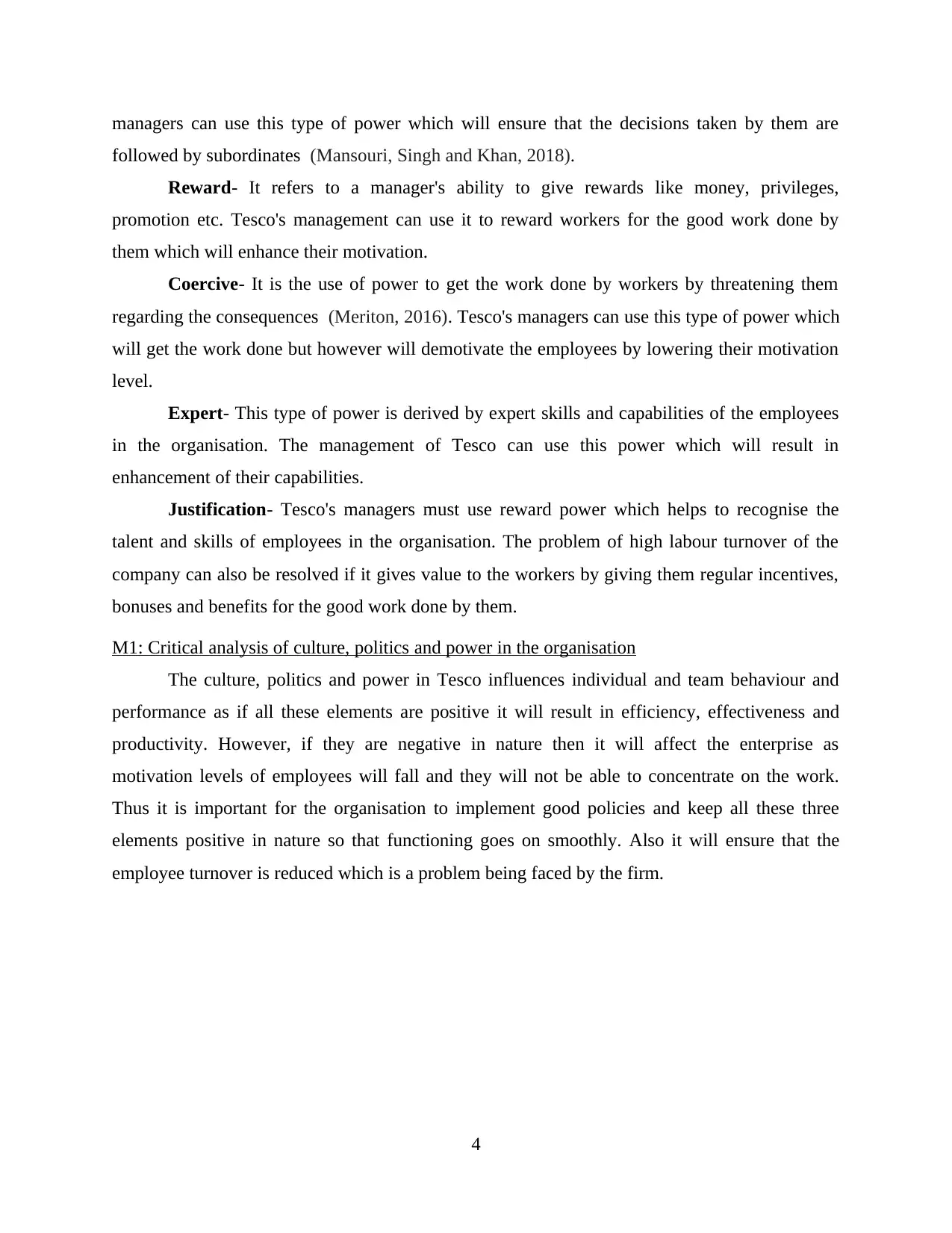
managers can use this type of power which will ensure that the decisions taken by them are
followed by subordinates (Mansouri, Singh and Khan, 2018).
Reward- It refers to a manager's ability to give rewards like money, privileges,
promotion etc. Tesco's management can use it to reward workers for the good work done by
them which will enhance their motivation.
Coercive- It is the use of power to get the work done by workers by threatening them
regarding the consequences (Meriton, 2016). Tesco's managers can use this type of power which
will get the work done but however will demotivate the employees by lowering their motivation
level.
Expert- This type of power is derived by expert skills and capabilities of the employees
in the organisation. The management of Tesco can use this power which will result in
enhancement of their capabilities.
Justification- Tesco's managers must use reward power which helps to recognise the
talent and skills of employees in the organisation. The problem of high labour turnover of the
company can also be resolved if it gives value to the workers by giving them regular incentives,
bonuses and benefits for the good work done by them.
M1: Critical analysis of culture, politics and power in the organisation
The culture, politics and power in Tesco influences individual and team behaviour and
performance as if all these elements are positive it will result in efficiency, effectiveness and
productivity. However, if they are negative in nature then it will affect the enterprise as
motivation levels of employees will fall and they will not be able to concentrate on the work.
Thus it is important for the organisation to implement good policies and keep all these three
elements positive in nature so that functioning goes on smoothly. Also it will ensure that the
employee turnover is reduced which is a problem being faced by the firm.
4
followed by subordinates (Mansouri, Singh and Khan, 2018).
Reward- It refers to a manager's ability to give rewards like money, privileges,
promotion etc. Tesco's management can use it to reward workers for the good work done by
them which will enhance their motivation.
Coercive- It is the use of power to get the work done by workers by threatening them
regarding the consequences (Meriton, 2016). Tesco's managers can use this type of power which
will get the work done but however will demotivate the employees by lowering their motivation
level.
Expert- This type of power is derived by expert skills and capabilities of the employees
in the organisation. The management of Tesco can use this power which will result in
enhancement of their capabilities.
Justification- Tesco's managers must use reward power which helps to recognise the
talent and skills of employees in the organisation. The problem of high labour turnover of the
company can also be resolved if it gives value to the workers by giving them regular incentives,
bonuses and benefits for the good work done by them.
M1: Critical analysis of culture, politics and power in the organisation
The culture, politics and power in Tesco influences individual and team behaviour and
performance as if all these elements are positive it will result in efficiency, effectiveness and
productivity. However, if they are negative in nature then it will affect the enterprise as
motivation levels of employees will fall and they will not be able to concentrate on the work.
Thus it is important for the organisation to implement good policies and keep all these three
elements positive in nature so that functioning goes on smoothly. Also it will ensure that the
employee turnover is reduced which is a problem being faced by the firm.
4
⊘ This is a preview!⊘
Do you want full access?
Subscribe today to unlock all pages.

Trusted by 1+ million students worldwide
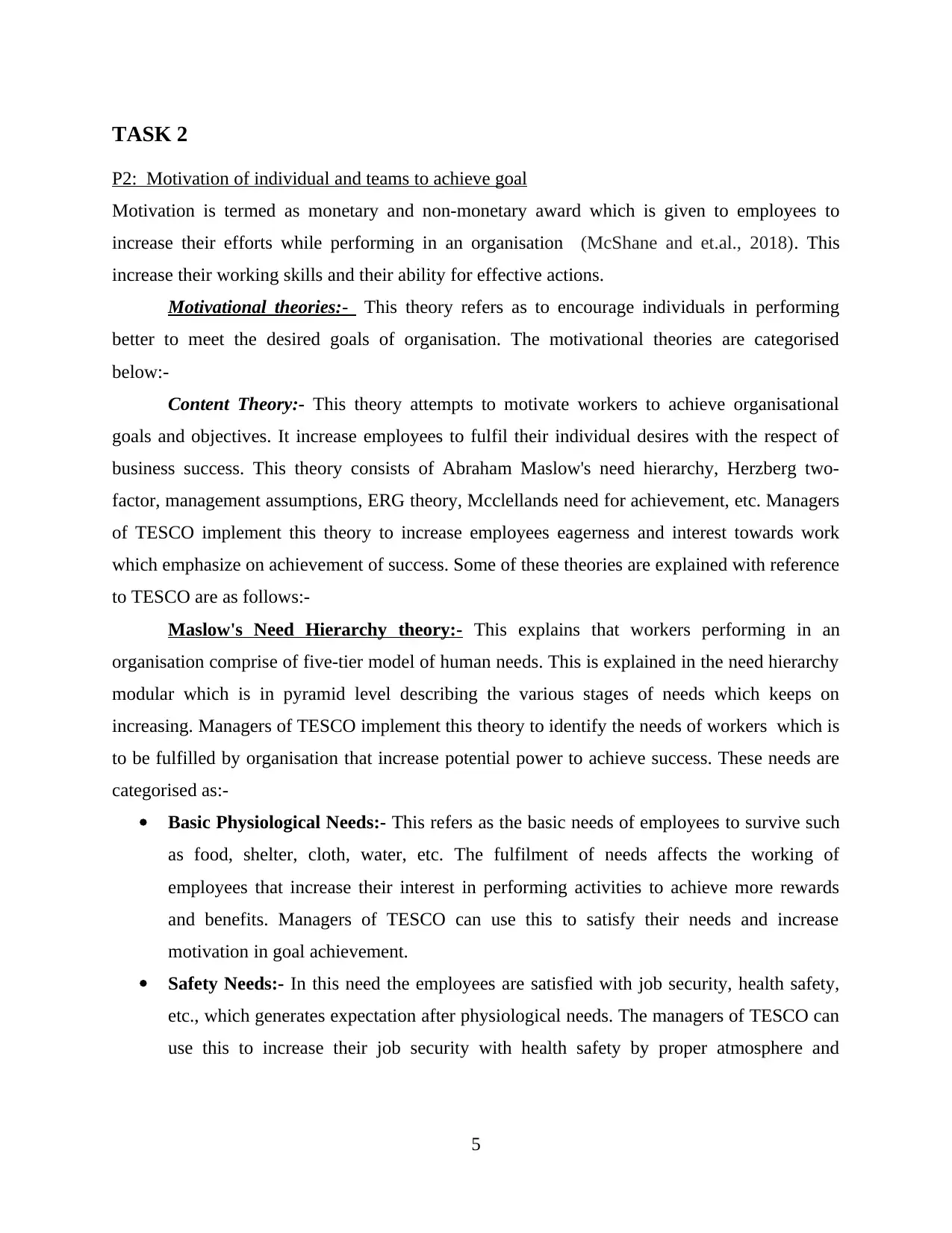
TASK 2
P2: Motivation of individual and teams to achieve goal
Motivation is termed as monetary and non-monetary award which is given to employees to
increase their efforts while performing in an organisation (McShane and et.al., 2018). This
increase their working skills and their ability for effective actions.
Motivational theories:- This theory refers as to encourage individuals in performing
better to meet the desired goals of organisation. The motivational theories are categorised
below:-
Content Theory:- This theory attempts to motivate workers to achieve organisational
goals and objectives. It increase employees to fulfil their individual desires with the respect of
business success. This theory consists of Abraham Maslow's need hierarchy, Herzberg two-
factor, management assumptions, ERG theory, Mcclellands need for achievement, etc. Managers
of TESCO implement this theory to increase employees eagerness and interest towards work
which emphasize on achievement of success. Some of these theories are explained with reference
to TESCO are as follows:-
Maslow's Need Hierarchy theory:- This explains that workers performing in an
organisation comprise of five-tier model of human needs. This is explained in the need hierarchy
modular which is in pyramid level describing the various stages of needs which keeps on
increasing. Managers of TESCO implement this theory to identify the needs of workers which is
to be fulfilled by organisation that increase potential power to achieve success. These needs are
categorised as:-
Basic Physiological Needs:- This refers as the basic needs of employees to survive such
as food, shelter, cloth, water, etc. The fulfilment of needs affects the working of
employees that increase their interest in performing activities to achieve more rewards
and benefits. Managers of TESCO can use this to satisfy their needs and increase
motivation in goal achievement.
Safety Needs:- In this need the employees are satisfied with job security, health safety,
etc., which generates expectation after physiological needs. The managers of TESCO can
use this to increase their job security with health safety by proper atmosphere and
5
P2: Motivation of individual and teams to achieve goal
Motivation is termed as monetary and non-monetary award which is given to employees to
increase their efforts while performing in an organisation (McShane and et.al., 2018). This
increase their working skills and their ability for effective actions.
Motivational theories:- This theory refers as to encourage individuals in performing
better to meet the desired goals of organisation. The motivational theories are categorised
below:-
Content Theory:- This theory attempts to motivate workers to achieve organisational
goals and objectives. It increase employees to fulfil their individual desires with the respect of
business success. This theory consists of Abraham Maslow's need hierarchy, Herzberg two-
factor, management assumptions, ERG theory, Mcclellands need for achievement, etc. Managers
of TESCO implement this theory to increase employees eagerness and interest towards work
which emphasize on achievement of success. Some of these theories are explained with reference
to TESCO are as follows:-
Maslow's Need Hierarchy theory:- This explains that workers performing in an
organisation comprise of five-tier model of human needs. This is explained in the need hierarchy
modular which is in pyramid level describing the various stages of needs which keeps on
increasing. Managers of TESCO implement this theory to identify the needs of workers which is
to be fulfilled by organisation that increase potential power to achieve success. These needs are
categorised as:-
Basic Physiological Needs:- This refers as the basic needs of employees to survive such
as food, shelter, cloth, water, etc. The fulfilment of needs affects the working of
employees that increase their interest in performing activities to achieve more rewards
and benefits. Managers of TESCO can use this to satisfy their needs and increase
motivation in goal achievement.
Safety Needs:- In this need the employees are satisfied with job security, health safety,
etc., which generates expectation after physiological needs. The managers of TESCO can
use this to increase their job security with health safety by proper atmosphere and
5
Paraphrase This Document
Need a fresh take? Get an instant paraphrase of this document with our AI Paraphraser
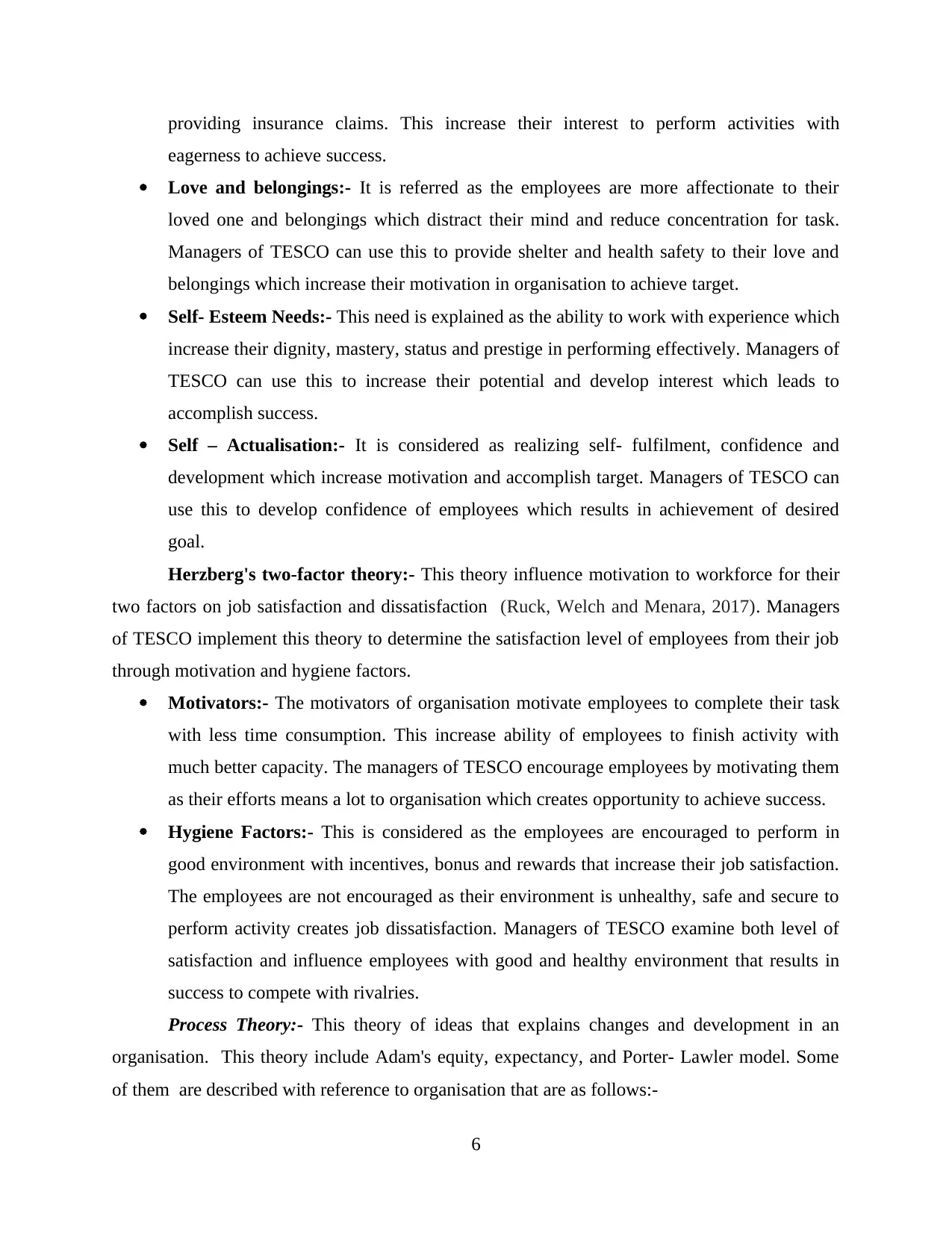
providing insurance claims. This increase their interest to perform activities with
eagerness to achieve success.
Love and belongings:- It is referred as the employees are more affectionate to their
loved one and belongings which distract their mind and reduce concentration for task.
Managers of TESCO can use this to provide shelter and health safety to their love and
belongings which increase their motivation in organisation to achieve target.
Self- Esteem Needs:- This need is explained as the ability to work with experience which
increase their dignity, mastery, status and prestige in performing effectively. Managers of
TESCO can use this to increase their potential and develop interest which leads to
accomplish success.
Self – Actualisation:- It is considered as realizing self- fulfilment, confidence and
development which increase motivation and accomplish target. Managers of TESCO can
use this to develop confidence of employees which results in achievement of desired
goal.
Herzberg's two-factor theory:- This theory influence motivation to workforce for their
two factors on job satisfaction and dissatisfaction (Ruck, Welch and Menara, 2017). Managers
of TESCO implement this theory to determine the satisfaction level of employees from their job
through motivation and hygiene factors.
Motivators:- The motivators of organisation motivate employees to complete their task
with less time consumption. This increase ability of employees to finish activity with
much better capacity. The managers of TESCO encourage employees by motivating them
as their efforts means a lot to organisation which creates opportunity to achieve success.
Hygiene Factors:- This is considered as the employees are encouraged to perform in
good environment with incentives, bonus and rewards that increase their job satisfaction.
The employees are not encouraged as their environment is unhealthy, safe and secure to
perform activity creates job dissatisfaction. Managers of TESCO examine both level of
satisfaction and influence employees with good and healthy environment that results in
success to compete with rivalries.
Process Theory:- This theory of ideas that explains changes and development in an
organisation. This theory include Adam's equity, expectancy, and Porter- Lawler model. Some
of them are described with reference to organisation that are as follows:-
6
eagerness to achieve success.
Love and belongings:- It is referred as the employees are more affectionate to their
loved one and belongings which distract their mind and reduce concentration for task.
Managers of TESCO can use this to provide shelter and health safety to their love and
belongings which increase their motivation in organisation to achieve target.
Self- Esteem Needs:- This need is explained as the ability to work with experience which
increase their dignity, mastery, status and prestige in performing effectively. Managers of
TESCO can use this to increase their potential and develop interest which leads to
accomplish success.
Self – Actualisation:- It is considered as realizing self- fulfilment, confidence and
development which increase motivation and accomplish target. Managers of TESCO can
use this to develop confidence of employees which results in achievement of desired
goal.
Herzberg's two-factor theory:- This theory influence motivation to workforce for their
two factors on job satisfaction and dissatisfaction (Ruck, Welch and Menara, 2017). Managers
of TESCO implement this theory to determine the satisfaction level of employees from their job
through motivation and hygiene factors.
Motivators:- The motivators of organisation motivate employees to complete their task
with less time consumption. This increase ability of employees to finish activity with
much better capacity. The managers of TESCO encourage employees by motivating them
as their efforts means a lot to organisation which creates opportunity to achieve success.
Hygiene Factors:- This is considered as the employees are encouraged to perform in
good environment with incentives, bonus and rewards that increase their job satisfaction.
The employees are not encouraged as their environment is unhealthy, safe and secure to
perform activity creates job dissatisfaction. Managers of TESCO examine both level of
satisfaction and influence employees with good and healthy environment that results in
success to compete with rivalries.
Process Theory:- This theory of ideas that explains changes and development in an
organisation. This theory include Adam's equity, expectancy, and Porter- Lawler model. Some
of them are described with reference to organisation that are as follows:-
6
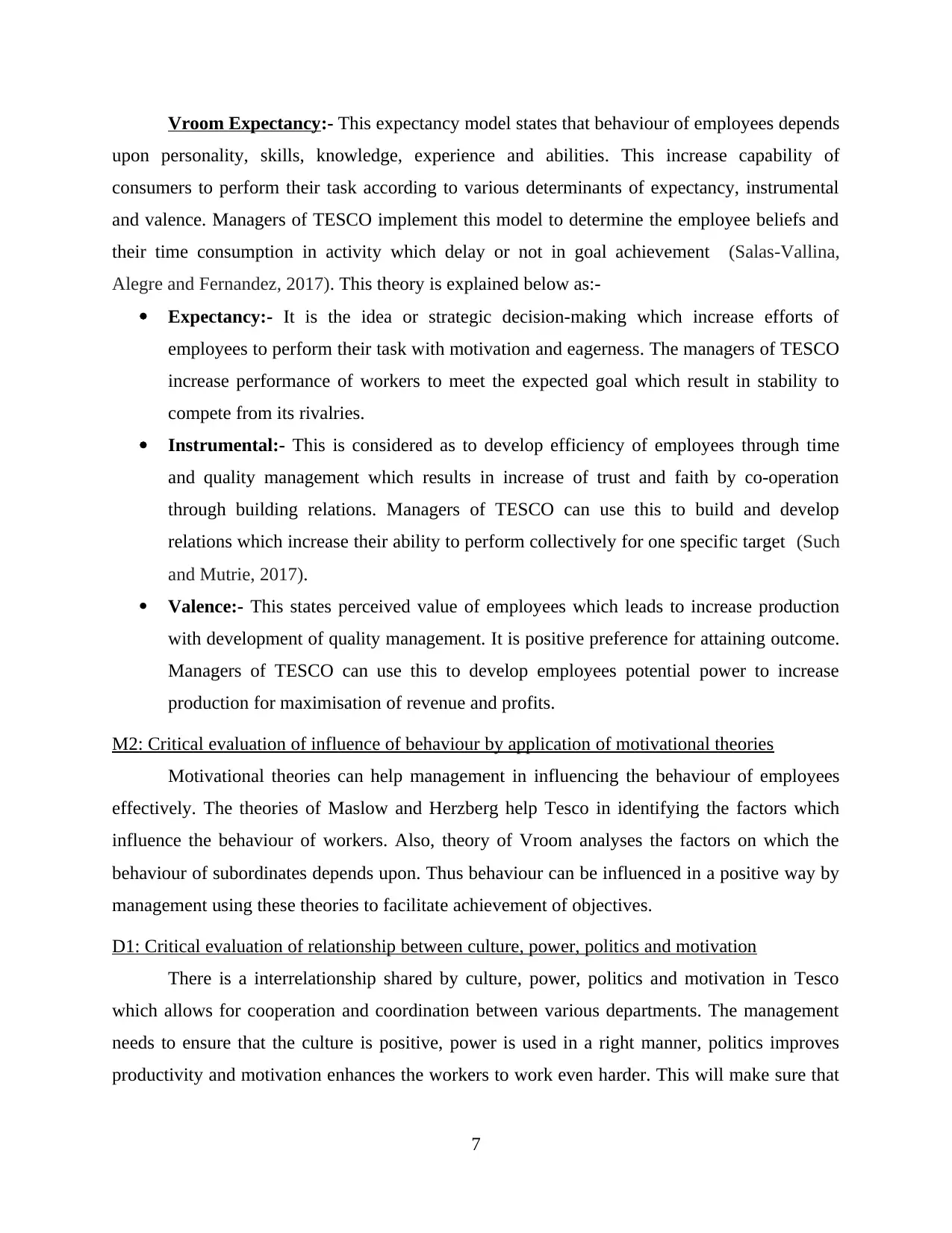
Vroom Expectancy:- This expectancy model states that behaviour of employees depends
upon personality, skills, knowledge, experience and abilities. This increase capability of
consumers to perform their task according to various determinants of expectancy, instrumental
and valence. Managers of TESCO implement this model to determine the employee beliefs and
their time consumption in activity which delay or not in goal achievement (Salas-Vallina,
Alegre and Fernandez, 2017). This theory is explained below as:-
Expectancy:- It is the idea or strategic decision-making which increase efforts of
employees to perform their task with motivation and eagerness. The managers of TESCO
increase performance of workers to meet the expected goal which result in stability to
compete from its rivalries.
Instrumental:- This is considered as to develop efficiency of employees through time
and quality management which results in increase of trust and faith by co-operation
through building relations. Managers of TESCO can use this to build and develop
relations which increase their ability to perform collectively for one specific target (Such
and Mutrie, 2017).
Valence:- This states perceived value of employees which leads to increase production
with development of quality management. It is positive preference for attaining outcome.
Managers of TESCO can use this to develop employees potential power to increase
production for maximisation of revenue and profits.
M2: Critical evaluation of influence of behaviour by application of motivational theories
Motivational theories can help management in influencing the behaviour of employees
effectively. The theories of Maslow and Herzberg help Tesco in identifying the factors which
influence the behaviour of workers. Also, theory of Vroom analyses the factors on which the
behaviour of subordinates depends upon. Thus behaviour can be influenced in a positive way by
management using these theories to facilitate achievement of objectives.
D1: Critical evaluation of relationship between culture, power, politics and motivation
There is a interrelationship shared by culture, power, politics and motivation in Tesco
which allows for cooperation and coordination between various departments. The management
needs to ensure that the culture is positive, power is used in a right manner, politics improves
productivity and motivation enhances the workers to work even harder. This will make sure that
7
upon personality, skills, knowledge, experience and abilities. This increase capability of
consumers to perform their task according to various determinants of expectancy, instrumental
and valence. Managers of TESCO implement this model to determine the employee beliefs and
their time consumption in activity which delay or not in goal achievement (Salas-Vallina,
Alegre and Fernandez, 2017). This theory is explained below as:-
Expectancy:- It is the idea or strategic decision-making which increase efforts of
employees to perform their task with motivation and eagerness. The managers of TESCO
increase performance of workers to meet the expected goal which result in stability to
compete from its rivalries.
Instrumental:- This is considered as to develop efficiency of employees through time
and quality management which results in increase of trust and faith by co-operation
through building relations. Managers of TESCO can use this to build and develop
relations which increase their ability to perform collectively for one specific target (Such
and Mutrie, 2017).
Valence:- This states perceived value of employees which leads to increase production
with development of quality management. It is positive preference for attaining outcome.
Managers of TESCO can use this to develop employees potential power to increase
production for maximisation of revenue and profits.
M2: Critical evaluation of influence of behaviour by application of motivational theories
Motivational theories can help management in influencing the behaviour of employees
effectively. The theories of Maslow and Herzberg help Tesco in identifying the factors which
influence the behaviour of workers. Also, theory of Vroom analyses the factors on which the
behaviour of subordinates depends upon. Thus behaviour can be influenced in a positive way by
management using these theories to facilitate achievement of objectives.
D1: Critical evaluation of relationship between culture, power, politics and motivation
There is a interrelationship shared by culture, power, politics and motivation in Tesco
which allows for cooperation and coordination between various departments. The management
needs to ensure that the culture is positive, power is used in a right manner, politics improves
productivity and motivation enhances the workers to work even harder. This will make sure that
7
⊘ This is a preview!⊘
Do you want full access?
Subscribe today to unlock all pages.

Trusted by 1+ million students worldwide
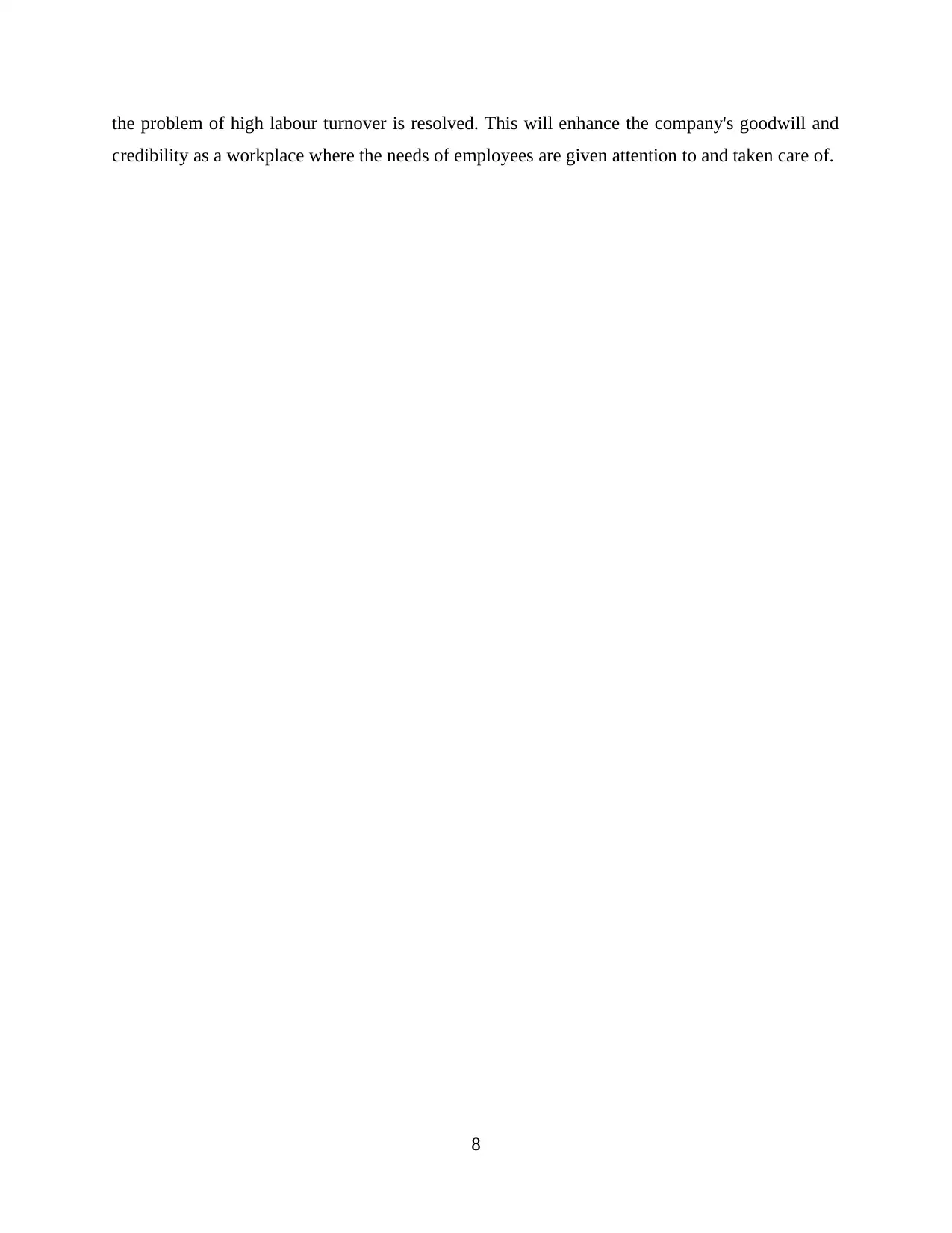
the problem of high labour turnover is resolved. This will enhance the company's goodwill and
credibility as a workplace where the needs of employees are given attention to and taken care of.
8
credibility as a workplace where the needs of employees are given attention to and taken care of.
8
Paraphrase This Document
Need a fresh take? Get an instant paraphrase of this document with our AI Paraphraser
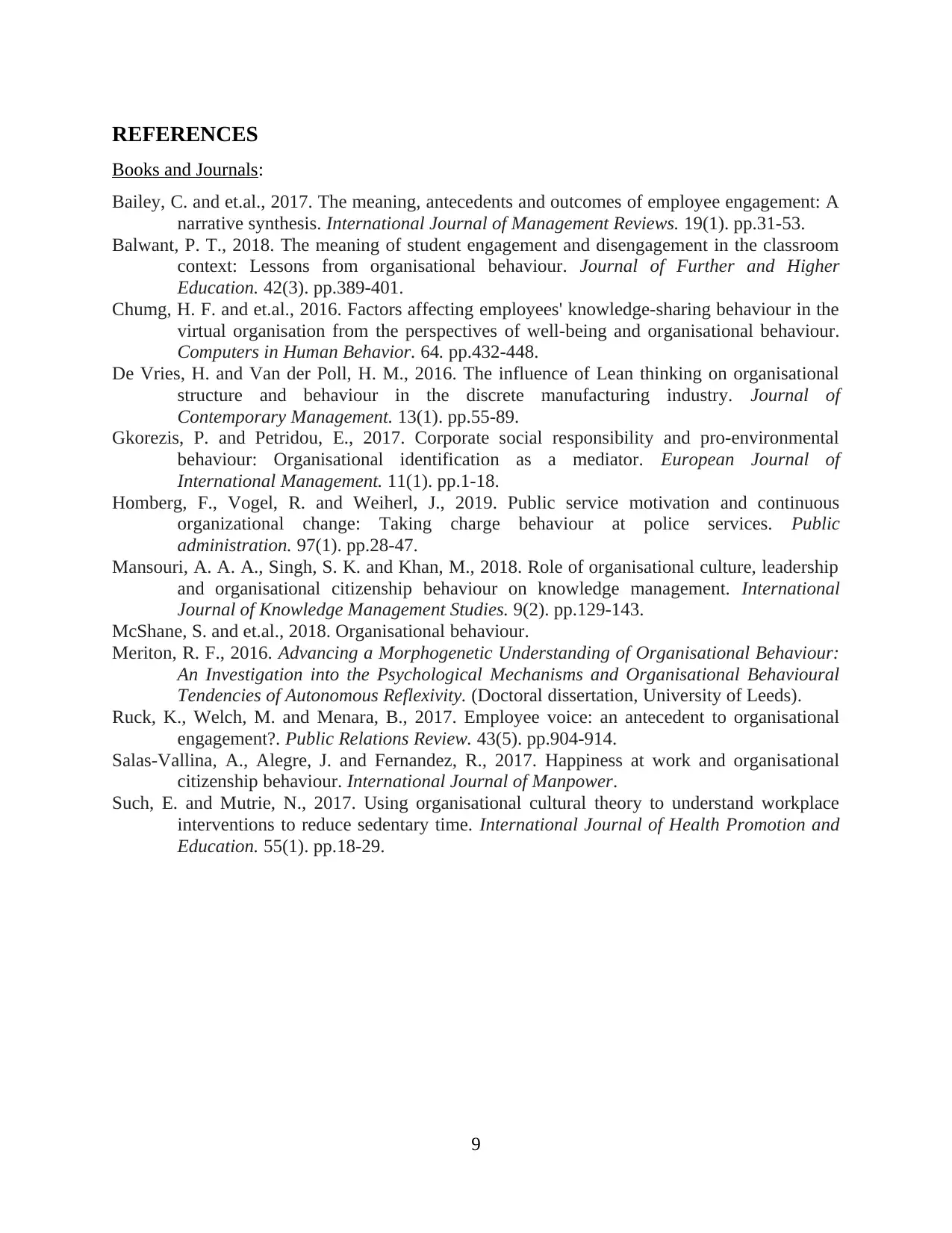
REFERENCES
Books and Journals:
Bailey, C. and et.al., 2017. The meaning, antecedents and outcomes of employee engagement: A
narrative synthesis. International Journal of Management Reviews. 19(1). pp.31-53.
Balwant, P. T., 2018. The meaning of student engagement and disengagement in the classroom
context: Lessons from organisational behaviour. Journal of Further and Higher
Education. 42(3). pp.389-401.
Chumg, H. F. and et.al., 2016. Factors affecting employees' knowledge-sharing behaviour in the
virtual organisation from the perspectives of well-being and organisational behaviour.
Computers in Human Behavior. 64. pp.432-448.
De Vries, H. and Van der Poll, H. M., 2016. The influence of Lean thinking on organisational
structure and behaviour in the discrete manufacturing industry. Journal of
Contemporary Management. 13(1). pp.55-89.
Gkorezis, P. and Petridou, E., 2017. Corporate social responsibility and pro-environmental
behaviour: Organisational identification as a mediator. European Journal of
International Management. 11(1). pp.1-18.
Homberg, F., Vogel, R. and Weiherl, J., 2019. Public service motivation and continuous
organizational change: Taking charge behaviour at police services. Public
administration. 97(1). pp.28-47.
Mansouri, A. A. A., Singh, S. K. and Khan, M., 2018. Role of organisational culture, leadership
and organisational citizenship behaviour on knowledge management. International
Journal of Knowledge Management Studies. 9(2). pp.129-143.
McShane, S. and et.al., 2018. Organisational behaviour.
Meriton, R. F., 2016. Advancing a Morphogenetic Understanding of Organisational Behaviour:
An Investigation into the Psychological Mechanisms and Organisational Behavioural
Tendencies of Autonomous Reflexivity. (Doctoral dissertation, University of Leeds).
Ruck, K., Welch, M. and Menara, B., 2017. Employee voice: an antecedent to organisational
engagement?. Public Relations Review. 43(5). pp.904-914.
Salas-Vallina, A., Alegre, J. and Fernandez, R., 2017. Happiness at work and organisational
citizenship behaviour. International Journal of Manpower.
Such, E. and Mutrie, N., 2017. Using organisational cultural theory to understand workplace
interventions to reduce sedentary time. International Journal of Health Promotion and
Education. 55(1). pp.18-29.
9
Books and Journals:
Bailey, C. and et.al., 2017. The meaning, antecedents and outcomes of employee engagement: A
narrative synthesis. International Journal of Management Reviews. 19(1). pp.31-53.
Balwant, P. T., 2018. The meaning of student engagement and disengagement in the classroom
context: Lessons from organisational behaviour. Journal of Further and Higher
Education. 42(3). pp.389-401.
Chumg, H. F. and et.al., 2016. Factors affecting employees' knowledge-sharing behaviour in the
virtual organisation from the perspectives of well-being and organisational behaviour.
Computers in Human Behavior. 64. pp.432-448.
De Vries, H. and Van der Poll, H. M., 2016. The influence of Lean thinking on organisational
structure and behaviour in the discrete manufacturing industry. Journal of
Contemporary Management. 13(1). pp.55-89.
Gkorezis, P. and Petridou, E., 2017. Corporate social responsibility and pro-environmental
behaviour: Organisational identification as a mediator. European Journal of
International Management. 11(1). pp.1-18.
Homberg, F., Vogel, R. and Weiherl, J., 2019. Public service motivation and continuous
organizational change: Taking charge behaviour at police services. Public
administration. 97(1). pp.28-47.
Mansouri, A. A. A., Singh, S. K. and Khan, M., 2018. Role of organisational culture, leadership
and organisational citizenship behaviour on knowledge management. International
Journal of Knowledge Management Studies. 9(2). pp.129-143.
McShane, S. and et.al., 2018. Organisational behaviour.
Meriton, R. F., 2016. Advancing a Morphogenetic Understanding of Organisational Behaviour:
An Investigation into the Psychological Mechanisms and Organisational Behavioural
Tendencies of Autonomous Reflexivity. (Doctoral dissertation, University of Leeds).
Ruck, K., Welch, M. and Menara, B., 2017. Employee voice: an antecedent to organisational
engagement?. Public Relations Review. 43(5). pp.904-914.
Salas-Vallina, A., Alegre, J. and Fernandez, R., 2017. Happiness at work and organisational
citizenship behaviour. International Journal of Manpower.
Such, E. and Mutrie, N., 2017. Using organisational cultural theory to understand workplace
interventions to reduce sedentary time. International Journal of Health Promotion and
Education. 55(1). pp.18-29.
9
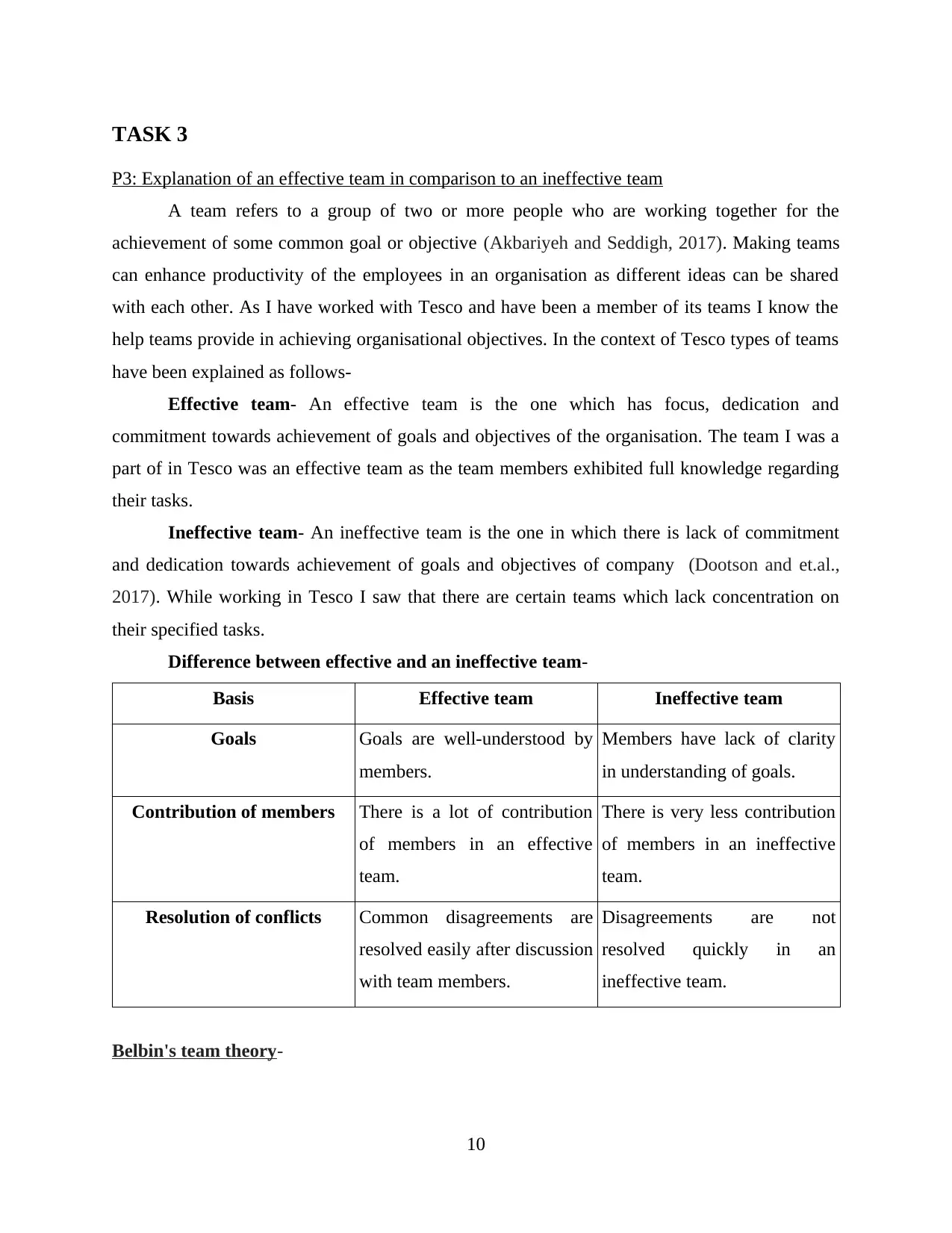
TASK 3
P3: Explanation of an effective team in comparison to an ineffective team
A team refers to a group of two or more people who are working together for the
achievement of some common goal or objective (Akbariyeh and Seddigh, 2017). Making teams
can enhance productivity of the employees in an organisation as different ideas can be shared
with each other. As I have worked with Tesco and have been a member of its teams I know the
help teams provide in achieving organisational objectives. In the context of Tesco types of teams
have been explained as follows-
Effective team- An effective team is the one which has focus, dedication and
commitment towards achievement of goals and objectives of the organisation. The team I was a
part of in Tesco was an effective team as the team members exhibited full knowledge regarding
their tasks.
Ineffective team- An ineffective team is the one in which there is lack of commitment
and dedication towards achievement of goals and objectives of company (Dootson and et.al.,
2017). While working in Tesco I saw that there are certain teams which lack concentration on
their specified tasks.
Difference between effective and an ineffective team-
Basis Effective team Ineffective team
Goals Goals are well-understood by
members.
Members have lack of clarity
in understanding of goals.
Contribution of members There is a lot of contribution
of members in an effective
team.
There is very less contribution
of members in an ineffective
team.
Resolution of conflicts Common disagreements are
resolved easily after discussion
with team members.
Disagreements are not
resolved quickly in an
ineffective team.
Belbin's team theory-
10
P3: Explanation of an effective team in comparison to an ineffective team
A team refers to a group of two or more people who are working together for the
achievement of some common goal or objective (Akbariyeh and Seddigh, 2017). Making teams
can enhance productivity of the employees in an organisation as different ideas can be shared
with each other. As I have worked with Tesco and have been a member of its teams I know the
help teams provide in achieving organisational objectives. In the context of Tesco types of teams
have been explained as follows-
Effective team- An effective team is the one which has focus, dedication and
commitment towards achievement of goals and objectives of the organisation. The team I was a
part of in Tesco was an effective team as the team members exhibited full knowledge regarding
their tasks.
Ineffective team- An ineffective team is the one in which there is lack of commitment
and dedication towards achievement of goals and objectives of company (Dootson and et.al.,
2017). While working in Tesco I saw that there are certain teams which lack concentration on
their specified tasks.
Difference between effective and an ineffective team-
Basis Effective team Ineffective team
Goals Goals are well-understood by
members.
Members have lack of clarity
in understanding of goals.
Contribution of members There is a lot of contribution
of members in an effective
team.
There is very less contribution
of members in an ineffective
team.
Resolution of conflicts Common disagreements are
resolved easily after discussion
with team members.
Disagreements are not
resolved quickly in an
ineffective team.
Belbin's team theory-
10
⊘ This is a preview!⊘
Do you want full access?
Subscribe today to unlock all pages.

Trusted by 1+ million students worldwide
1 out of 19
Related Documents
Your All-in-One AI-Powered Toolkit for Academic Success.
+13062052269
info@desklib.com
Available 24*7 on WhatsApp / Email
![[object Object]](/_next/static/media/star-bottom.7253800d.svg)
Unlock your academic potential
Copyright © 2020–2026 A2Z Services. All Rights Reserved. Developed and managed by ZUCOL.



